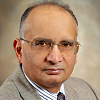Ramesh Thakur is emeritus professor at the Crawford School of Public Policy, Australian National University and a former United Nations Assistant Secretary-General.

By Ramesh Thakur
WELLINGTON – After the terror attacks of September 11, 2001, Le Monde famously proclaimed that “Today, we are all Americans.” In the wake of the horrors in Christchurch, New Zealand, we must make the same proclamation: Today, we are all Muslims. The evil of that white supremacist outrage must unite us. More than that, it must inspire the united will necessary both to combat genocidal hate and to implement effective measures to stop social media from enabling murderous rage.
I arrived in New Zealand on Friday, the Muslim day of prayer, which became a day of massacre. Like the assassination of Olof Palme in Sweden in 1986, the 9/11 attacks in the US, and the murderous rampage of Anders Breivik in Norway in 2011, March 15 will mark the day New Zealand lost its innocence and entered the age of postmodern mass terror.
The gunman, Brenton Tarrant, a 28-year old Australian living in Dunedin, a couple of hundred miles south of Christchurch, wore military fatigues and wielded two semiautomatic rifles, two shotguns, and one lever-action firearm as he stormed into two mosques. He live-streamed his methodical slaughter of 50 people at afternoon prayer on Facebook (another 50 were injured). The video, having been “shared” on Twitter and other social media platforms, has since been removed.
Tarrant also posted a 74-page “manifesto” on social media to explain his actions. Its title draws on the concept of the “Great Replacement” promoted by the French writer Renaud Camus. Adherents are convinced that the high volume of immigration now seen in the West is bringing about a “replacement” of host populations by immigrant – and of course, inferior – cultures. The influx of newcomers is resulting in a “white genocide.”
But today’s white supremacy is less a cohesive ideology than a smorgasbord of gut feelings that has been widely but shallowly disseminated across the Western world through social media. A specifically anti-Muslim angst is nothing new and can be traced back to Winston Churchill’s warnings of “militant Mohammedanism” in 1898 and Enoch Powell’s “Rivers of Blood” speech in 1968. Tarrant hates Third World immigrants, wanted revenge for Islamist attacks in Europe, and sought to incite fear among Muslims living in the West. He chose New Zealand precisely because of its remoteness, to show that even distant New Zealand suffers from mass immigration – and that no place on earth is safe.
In that sense, he succeeded. Shootings are rare in this peaceful piece of paradise on earth. And yet it was here that the worst massacre in New Zealand history – and the worst mass murder of Muslims anywhere in the geopolitical West – has occurred. Investigators will have to establish how one person could have accumulated so many weapons in a gun-controlled country. Prime Minister Jacinda Ardern has already said she will legislate still tighter controls.
Her statement Friday evening was pitch perfect: “We were not chosen for this violence because we condone racism,” but because “we represent diversity, kindness, compassion, a home for those who share our values, refuge for those who need it.” “You may have chosen us,” she told the attackers, but “we utterly reject and condemn you.”
The mood on the streets of Wellington on Saturday morning was somber. As I walked to the botanical gardens, a local club game of cricket was being played in an adjacent park. The black armbands of solidarity stood out starkly on the players’ crisp white shirtsleeves.
Christchurch proves conclusively that terrorism is not restricted to any one community or religion, but is a universal moral failing. Most contemporary terrorists may perpetrate their vile acts in the name of a distorted Islam, but it is equally true that most of the victims of Islamist terrorism continue to be Muslims.
Christchurch also proves the folly of making distinctions between “our” terrorists and “theirs,” condoning or tolerating one group while isolating and liquidating another. Security from the fear of terrorism truly is indivisible, and moral relativism has no place in meeting the challenge of ending the scourge. Indeed, the fight against terrorism is a war with no frontiers, against enemies who know no borders and have no scruples. If we abandon our scruples, we descend to their level
It may well be necessary to have an open, honest, and respectful public debate about the levels of immigration of different groups in order to maintain social cohesion. This can be done while affirming that every group already living in a country is entitled to full equality and protection of the law.
Whether terrorists are acting in the name of white supremacy or of Islam, their goal is the same: to divide the West from the Islamic world, to cement polarization, and to burn down the community of civilized countries with the flames of hatred. They must not be allowed to succeed.
In the end, there can be no guaranteed security against terrorists whose audacity, imagination, and cruelty know no limits. We must not destroy our most cherished values of liberty in the search for unattainable absolute security.
But while we must not allow reason – and our precious legacy of civil liberties and political freedoms – to be overwhelmed by grief, fear, and anger, we must examine whether and to what extent the social media that “hosted” the attack is now producing attackers. It may be only when we understand these platforms’ role – and respond accordingly – that we can honor the victims in the way they deserve: by recognizing our common humanity.
Copyright: Project Syndicate, 2019.
www.project-syndicate.org



